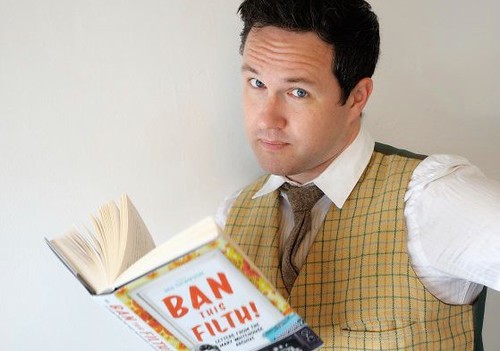Review – Ban This Filth!
✭✭✭✩✩ Thought-provoking
Scottish Storytelling Centre
Friday 20 September 2013
Review by Mark Bolsover
Gender and sexual identity are on the agenda as Alan Bissett returns for a one-off performance of his one-man show Ban This Filth!, to benefit the Edinburgh Women’s Rape and Sexual Abuse Centre.
Obviously nervous during his affable and chatty introduction, Bissett nonetheless proves to be an engaging, funny and charming – even somewhat cocksure – performer.
Ban This Filth assumes the form of an anecdotal quasi-stand-up show, complete with enjoyable elements of audience participation. This is punctuated with slightly strange performances of excerpts from the work of radical feminist Andrea Dworkin during which Bissett assumes Dworkin’s voice, without fully performing the character.
The show is interesting, fraught and even unsettling at times on the question of male sexuality. Bissett focuses on models of masculinity in popular culture, on pornography – of which Dworkin was a vociferous critic – and on men’s complicity in the abuse and exploitation of women.
The show may appear disjointed in its shifts between the anecdotal and the theoretical, but there is an implication of a parallel between Bissett’s experiences and Dworkin’s theorisation of pornography and male sexuality, which is clearly intended to tie these elements together.
The anecdotal aspect of the show is conventional: Bissett’s reminiscences move from his childhood, through adolescence, to maturity. His characterisation of his childhood and adolescence is wry and amusing. However, he characterises his personal growth as being solely concerned with sexuality, sexual appetite and attitudes toward sex.
Bissett is critical of the kind of male sexuality that he sees as being conditioned by sports, violence and popular culture, particularly in comic books and movies.
The problem is that this model of gender and sexuality, which are themselves problematically and uncritically identified with each other here, is entirely dependent on Bissett’s autobiographical context, and therefore on the geographically and socially specific context of working class Scots. Either as a result of disingenuousness, or a genuine intellectual mistake, Bissett implies that this model is absolute and universal, and seems to be using Dworkin’s writing to reinforce this.
Unquestioned authority
Bissett’s exploration of the increasing ease of access to, and the viewer’s complicity in, pornography is interesting. But there is no apparent room to challenge the simple model that he establishes here.
There is an unquestioned assumption that Bissett can simply use Dworkin’s work to read into her life and he chooses particularly anecdotal excerpts from her work. But he then assumes that this means he can identify in some way with Dworkin herself, presenting her as an unquestioned authority.
It is true that the latter part of the show goes some way to highlighting these problems. Particularly interesting is a sequence in which an exchange takes place between Bissett and an audience member, who takes on the role of a sex worker on a social networking site. Through this character and this exchange Bissett is able to highlight the naivety of his claims regarding sexuality and his reliance upon Dworkin.
Despite this gesture of self-awareness, and even of self-parody, however, the show fails to offer any real answers to the problems. This, alongside the confident, cocksure quality of Bissett’s performance, effectively means that the show’s end gambit (framed as potentially controversial on the ticket, which warns of ‘Possible nudity’) doesn’t pay off.
Bissett asks the audience whether or not he should undress to show solidarity with exploited women, but he is simply too confident and too self-aware for this attempt to demonstrate vulnerability to feel anything other than slightly glib, flat and somewhat affected. The stakes are simply not high enough.
Though certainly thought-provoking and consummately performed, Ban This Filth! ultimately fails to realise what felt (in the show’s concept and publicity) like a promised transformation. Something here remains to be spoken, realised and enacted…
Running time: 1hr
Scottish Storytelling Centre, 43-45 High Street, EH1 1SR
Run ended
Scottish Storytelling Theatre website: www.tracscotland.org
Edinburgh Women’s Rape and Sexual Abuse Centre website: www.ewrasac.org.uke
Andrea Dworkin’s books are available here, on Amazon
ENDS



















